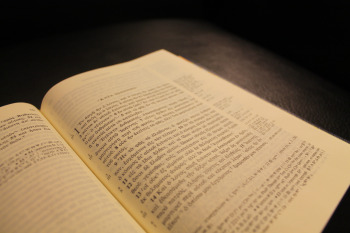"Unless One Is Born Again" -- John 3:1-15
 Tuesday, December 9, 2014 at 08:06AM
Tuesday, December 9, 2014 at 08:06AM  The Tenth in a Series of Sermons on the Gospel of John
The Tenth in a Series of Sermons on the Gospel of John
Only in modern American do Christians qualify someone’s profession of faith by whether or not they are “born again.” Only in American evangelicalism do we find one of the movement’s most prominent spokesmen (Billy Graham) writing a best-selling book entitled “How to be Born Again,” when ironically, the biblical account from which Graham takes his title actually teaches that we cannot “born ourselves again” because this is something only God can do. Telling people “how” to be born again, is like publishing a book entitled how to be taller. In light of the confusion about what it means to be “born again” it is important that we work our way through John 3 (where this phrase appears) and that we consider what Jesus actually says about the new birth.
In the second chapter of his Gospel, John recounts the first of Jesus’ seven miraculous signs when Jesus attended a wedding at Cana. Jesus miraculously turned 150 gallons of water into wine so as to reveal his glory, and to fulfill a series of messianic prophecies which speak of the dawn of the messianic age in terms of a great feast with rich food and fine wine. When Jesus turns water in wine, he is beginning to perform those greater signs which he promised to his disciples. It is also clear from the nature of this miracle that Jesus is Israel’s Messiah and that promised one in whom the messianic age dawns.
We read in the second half of John 2, that at some point shortly after attending the wedding in Cana, Jesus went up to Jerusalem to celebrate the Passover. It was in Jerusalem that Jesus performed his second miracle when he cleansed the temple by driving out those who had corrupted the temple’s true purpose. Upon entering the temple, which Jesus calls his father’s house, Jesus was angry when he found the outer court of the temple filled with merchants selling animals to pilgrims coming to the city to celebrate the Passover. Money-changers were also present, engaging in currency exchange so the pilgrims could pay the annual temple tax. Jesus was not upset that the merchants and money changers were making it easier for Jewish pilgrims to celebrate the Passover. He was indignant that the Jewish religious authorities allowed these merchants to conduct their business in that part of temple reserved for Gentiles to worship YHWH. Making a cord of whips, Jesus drove them all out. “Take these things away; do not make my Father's house a house of trade.”
At the end of chapter 2, we learn that “when [Jesus] was in Jerusalem at the Passover Feast, many believed in his name when they saw the signs that he was doing. But Jesus on his part did not entrust himself to them, because he knew all people and needed no one to bear witness about man, for he himself knew what was in man.” Apparently, Jesus performed a number of unspecified miracles during the time he was in Jerusalem, and this attracted a number of people who began following him for all the wrong reasons. When John alerts us to the fact that Jesus did not entrust himself to these new followers (despite their faith in him) it was because Jesus knew what was in people’s hearts–darkness. He knew that true faith was not based upon miraculous signs, but is grounded in trusting in God’s promise to save sinners.
To read the rest of this sermon: Click Here


Reader Comments